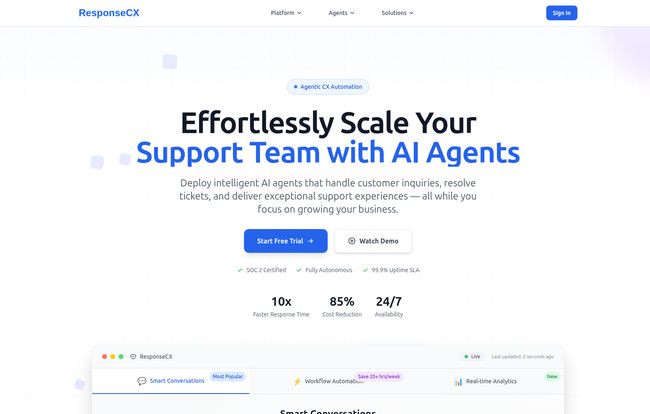If you're running a Shopify store, you know the grind. The constant ping of support tickets. "Where's my order?" "How do I return this?" "Can I change my subscription?" It’s a never-ending cycle that can burn out even the most passionate entrepreneur. For years, we've been promised chatbots would save us, but they often felt... well, dumb. They’d get stuck in loops, misunderstand simple requests, and end up frustrating customers more than helping them.
I've been in the SEO and traffic generation game for a while, and I've seen countless tools promise to revolutionize e-commerce. Most are just smoke and mirrors. So, when I came across ResponseCX and its bold claim of handling 84% of support tickets without human help, my skepticism meter went off the charts. But then I looked closer. This isn't just another chatbot. This is different.

Visit ResponseCX
So, What is ResponseCX, Really?
Forget the clunky chatbots of yesterday. ResponseCX is an AI-powered customer service platform built specifically for the chaos of a Shopify brand. Think of it less as a bot and more as a highly-trained, lightning-fast junior support agent who works 24/7, speaks multiple languages, and never calls in sick. Its brain is powered by GPT-4o, the latest and greatest from OpenAI, which means it can understand context, nuance, and even customer sentiment in a way that feels surprisingly human.
But here's the kicker and what really caught my eye: it doesn’t just answer questions. Thanks to its deep integrations, it can actually do things. It can process returns, modify an order, update a shipping address, or manage a subscription right within your existing systems. It's an action-taker, not just a talker.
The Features That Actually Matter for Your Shopify Store
Marketing materials are always full of shiny features. But which ones will actually make a difference to your bottom line and your sanity? I've waded through the jargon for you.
24/7 Support That Isn't a Robot Reading a Script
This is the headline feature. Because it's powered by a top-tier language model, the conversations are smoother. It can pull information directly from your knowledge base, order history, and product details to give tailored, accurate answers. And the multi-language support isn't some clunky Google Translate job; it’s designed to be genuinely conversational, which is a huge win for brands selling internationally.
Deep Integration That Does the Heavy Lifting
This is its secret weapon. ResponseCX plugs directly into the software you already use. We're talking Shopify, of course, but also helpdesks like Gorgias and Zendesk, and subscription tools like ReCharge. This is what allows it to go beyond simple Q&A. When a customer asks to change their shipping address, the AI doesn't just say, "Please contact support." It accesses the order, makes the change, and confirms it with the customer. That one capability alone is a game-changer for reducing your team's manual workload.
Function Calling and Multi-Agent Magic
Okay, this sounds a bit technical, but stick with me. "Function calling" is basically the magic that lets the AI use other tools. It’s how it talks to Shopify or Zendesk to perform those actions we just discussed. The "multi-agent" part means you can deploy different AIs for different tasks—one for returns, one for subscriptions, etc. It’s like building a specialized support team where every member is an expert in their one specific job. Pretty smart.
Let's Talk Numbers: Does ResponseCX Actually Save You Money?
Alright, this is where the rubber meets the road. Can an AI platform with a premium price tag actually improve your ROI? The claim is a reduction in support costs by up to 40%. It sounds ambitious, but when you do the math on how many hours your team spends on repetitive tasks, it starts to make sense.
The Good, The Bad, and The Price Tag
First off, this isn't a cheap, plug-and-play app. It's an investment. The setup requires some effort to integrate it into your systems and train it on your brand's voice and knowledge base. That's one of the noted downsides. But good things rarely come without some initial work, right?
Here’s a breakdown of their pricing structure as of my last check:
| Plan | Price per Month | Key Features |
|---|---|---|
| Essential | $1,520 | 1 Admin User, 3 Integrations, Basic AI Features |
| Professional | $2,456 | 3 Admin Users, 5 Integrations, Advanced AI, Memories, Computer Use |
| Enterprise | Contact for Pricing | 5+ Admin Users, 7+ Integrations, Dedicated Engineer, Priority Support |
Note: These prices are subject to change, so always check their official pricing page for the latest info.
One crucial detail is the "Autonomous Outcomes Based Pricing." Each plan comes with an allotment of automated resolutions. If you exceed it, you pay a small fee (around $2) for each extra ticket the AI handles on its own. It's a pay-as-you-grow model, which is fair, but definitely something to monitor in your budget.
Who Is This For? (And Who Should Pass?)
In my opinion, ResponseCX is not for the brand new Shopify store owner with 10 orders a day. If you're just starting out, the cost and setup are likely overkill. You should be handling those early customer interactions personally anyway—it's invaluable for learning about your audience.
However, if you're an established brand, maybe doing $1M+ in revenue, and your support team is drowning in tickets, this is who ResponseCX is built for. If you're looking to scale without tripling your support headcount, or if you want to offer true 24/7 support without running a global team, this platform could be a perfect fit. It's for the business that has identified the bottlenecks and is ready to invest in a powerful solution to clear them.
A Few Burning Questions Answered (FAQ)
Here are some quick answers to questions I've seen pop up, or that I had myself.
What kind of tasks can ResponseCX actually automate?
The most common use cases are the ones that clog up your support inbox the most: tracking orders (WISMO), initiating returns and exchanges, making changes to an existing order (like address or item), and managing customer subscriptions. It's all teh tedious stuff that takes up a human's valuable time.
How does it ensure the AI responses are accurate?
It relies on a few things. First, it integrates with your knowledge base (like a help center) to pull factual information. Second, it connects directly to live data from Shopify and your other apps for order-specific questions. Finally, you can review and evaluate AI conversations to help it learn and improve over time.
Is it difficult to set up?
There's definitely an onboarding process. It's not a one-click install. You'll need to connect your systems and help train the AI on your brand's specific policies and voice. The company offers support for this, and the higher-tier plans even come with a dedicated engineer. I'd budget some time for implementation.
What if the AI can't solve a customer's issue?
This is key. A good AI knows its limits. If a query is too complex, too sensitive, or the AI simply doesn't have an answer, it's designed to escalate the ticket seamlessly to a human agent in your helpdesk. This prevents customer frustration and ensures tough problems still get a personal touch.
Is there a free trial?
As of now, they don't list a public free trial on their site. They encourage scheduling a demo to see the platform in action, which makes sense for a tool at this price point. It's more of a consultative sale.
My Final Verdict on ResponseCX
I've seen a lot of AI hype, but ResponseCX feels like it has real substance. It’s a serious tool for a serious problem. By focusing on automating actions, not just conversations, it tackles the root cause of support overload for growing e-commerce brands. The price tag means it's a considered purchase, but for the right company, the potential ROI in saved time, reduced headcount costs, and increased customer satisfaction is massive.
Is it the end of human customer support? No. But it might just be the end of humans having to answer "Where is my order?" a hundred times a day. And for that, I think we can all be grateful.



